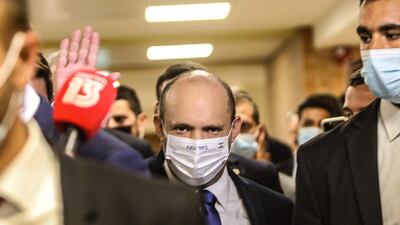Israel's parliament voted in favour of a new grand coalition government on Sunday, ending Benjamin Netanyahu’s 12-year tenure.
The new government was brought in by a razor-thin margin of 60 to 59. One member abstained.
It brings together unlikely partners including right-wing nationalist Naftali Bennett, centrist former TV host Yair Lapid and Arab Mansour Abbas.
The vote in the Knesset on Sunday pushed prime minister Benjamin Netanyahu, Israel’s longest-serving leader, out of power and ended a two-year cycle of political paralysis in which the country held four elections.
Mr Bennett addressed the Knesset before the vote.
His speech was met by heckling from members of Mr Netanyahu's Likud party. Several members of parliament were ushered out after yelling during Mr Bennett's speech.
"The loud tone of the screams is the same as the failure to govern during your term in office," he said. "It’s time for responsible leaders from different parts of the nation to stop this madness."
He named his cross-party Cabinet members. Mr Lapid will be the alternate prime minister and Foreign Minister while Benny Gantz will continue as Defence Minister.
Mr Lapid, who had been due to make a speech, stood before parliament only briefly to say: “I want to ask forgiveness from my mother.
"My mother is 86 years old. We don't ask her lightly to come to Jerusalem, but we did this because I assumed that you would be able to restrain yourselves and act in a statesman-like manner at this important moment, and she would see how a government is replaced."
Mr Netanyahu did not leave quietly, taking his last opportunity to speak as prime minister to criticise the new government’s stand on Iran and claim voter fraud.
He said that under his leadership, the right wing had turned Israel into a world leader.
"We did this without surrendering to international pressures, but out of fostering the economic, the defensive prowess of the state of Israel," Mr Netanyahu said.
He said the new "left-wing" government would do little to battle Iran and the US attempt to salvage the 2015 nuclear deal, a policy Mr Netanyahu has opposed.
“Bennett hasn’t got the international standing, the integrity, the capability, the knowledge and he hasn’t got the government to oppose the nuclear agreement," he told the Knesset.
"That is the biggest problem. An Israeli PM needs to be able to say no to the leader of the world’s superpower."
But Nr Netanyahu promised he would return to Israeli politics. He pledged to not be silenced and said he would do "daily battle against the incoming government".
The new government will be politically wide-ranging and includes the far left and the far right.
It will also be a significant moment in Israeli history because an independent Arab party is included.
Mr Bennett will be prime minister for the first two years before handing over to Mr Lapid for the last two years of the parliament's term – if they can keep the coalition together that long.
12 years of Benjamin Netanyahu – in pictures
The coalition parties have agreed to largely sidestep divisive topics, including policy towards Palestinians, and focus on domestic reform and rebuilding the economy battered by the Covid-19 pandemic.
Centrist Mickey Levy was voted in as the new Speaker of parliament, solidifying the new government era.
The vote for Mr Levy came before the vote to confirm the new government, which was immediately sworn in.
The now former prime minister will take up the role in opposition, holding the new government to account.
Protesters gathered outside Mr Netanyahu’s home at the weekend chanting “Bye bye Bibi, bye bye”, using his popular nickname.
They celebrated the downfall of a man facing trial for corruption and what opponents say is a legacy of placing his own political survival above the needs of the country.
“Netanyahu’s ideology throughout the last 12 years has been a disaster – just like the Trump administration,” said Haim Flikier, 69, a supporter of the new government.
"It won’t be easy with Bennett but we need to change the dynamics, we need to unite people. We need stability, peace and brotherhood.”
But Mr Netanyahu's many supporters will struggle to accept the end of the road for a defining figure in Israeli politics and a man who has dealt with years of international pressure on the peace process while defending the nation from the threat he sees from Iran.
Who is in the new Israeli coalition?
Yair Lapid: Yesh Atid (There is a Future) 17 seats
Benny Gantz: Kahol Lavan (Blue and White) 8 seats
Avigdor Lieberman: Israel Beiteinu (Israel Our Home) 7 seats
Merav Michaeli: HaAvoda (Labour) 7 seats
Naftali Bennett: Yamina (Rightwards) 7 seats
Gideon Sa'ar: Tikva Hadasha (New Hope) 6 seats
Nitzan Horowitz: Meretz (Vigour) 6 seats
Mansour Abbas: Raam (United Arab List) 4 seats
Read more:
Who is in Israel's new coalition government?
Biden and Merkel lead international community in 'warm' welcome for new Israeli government







































